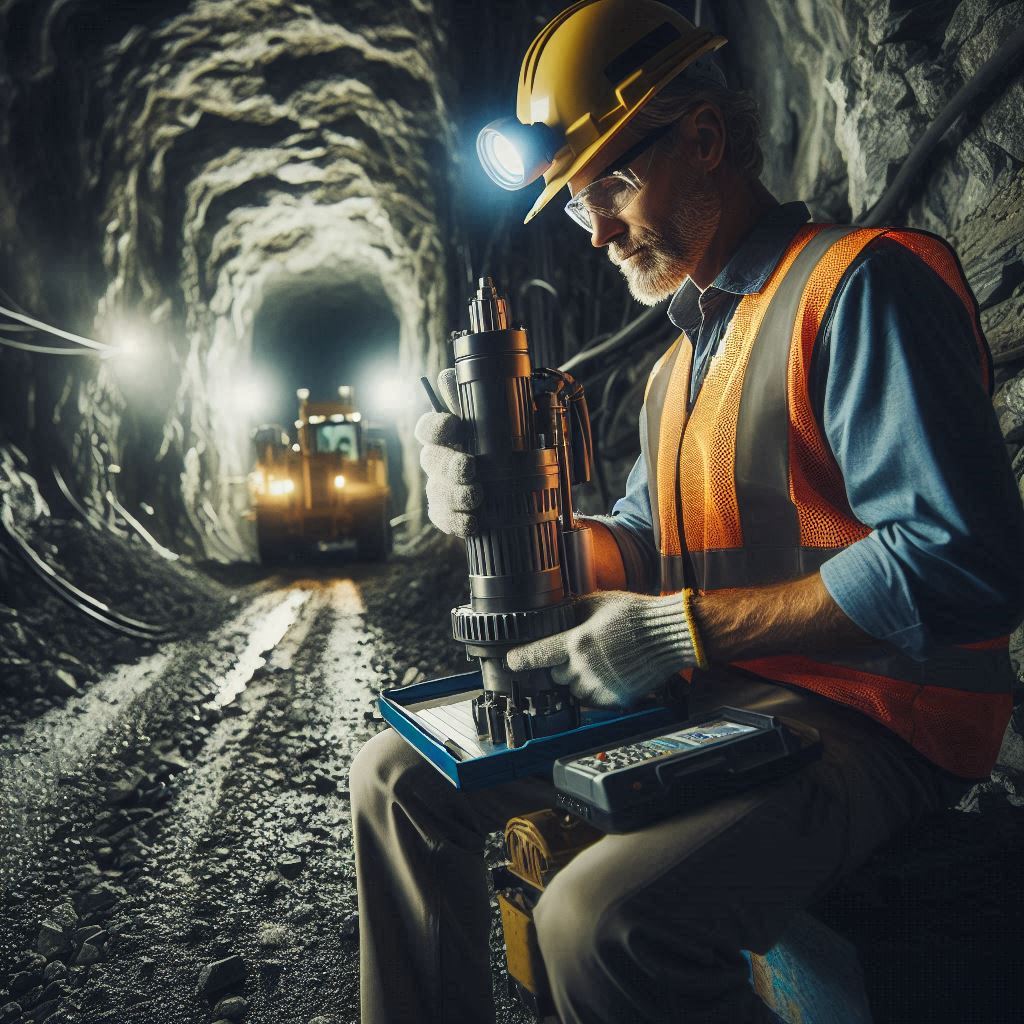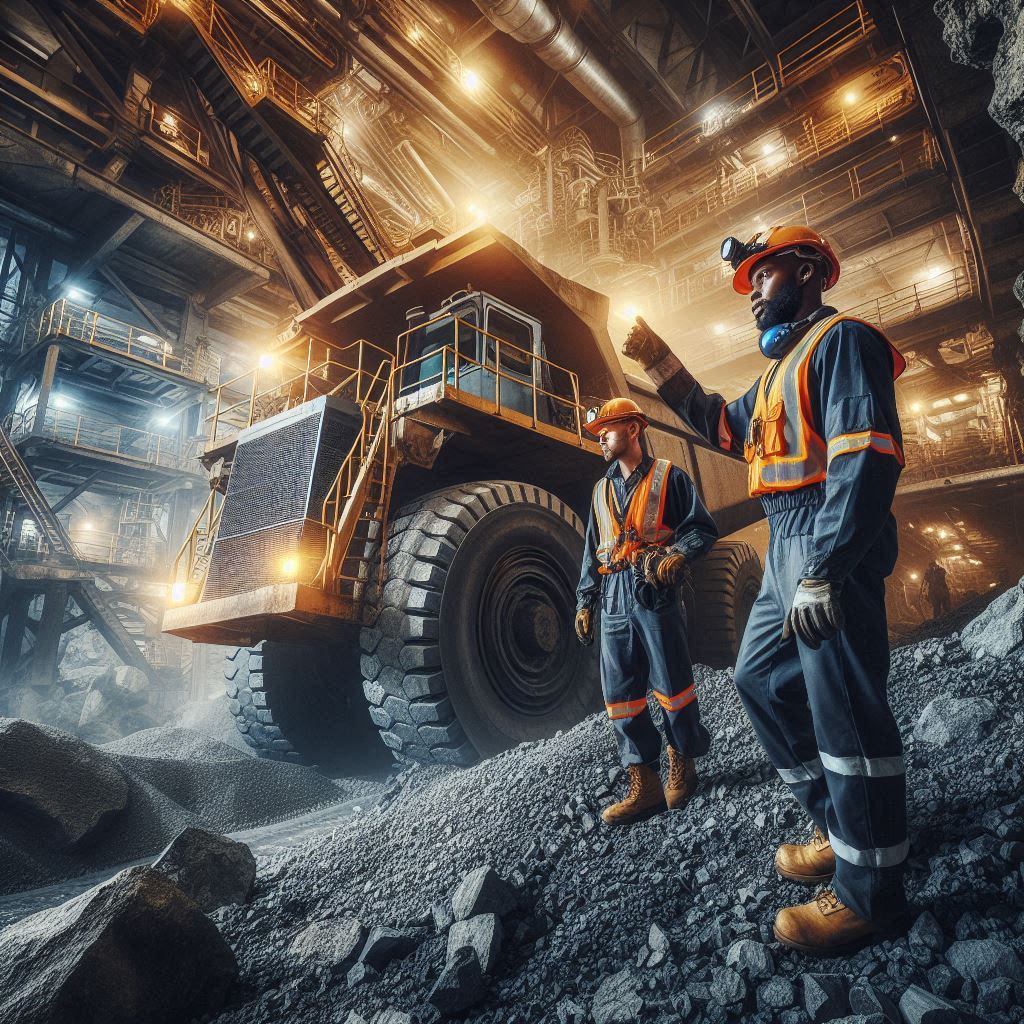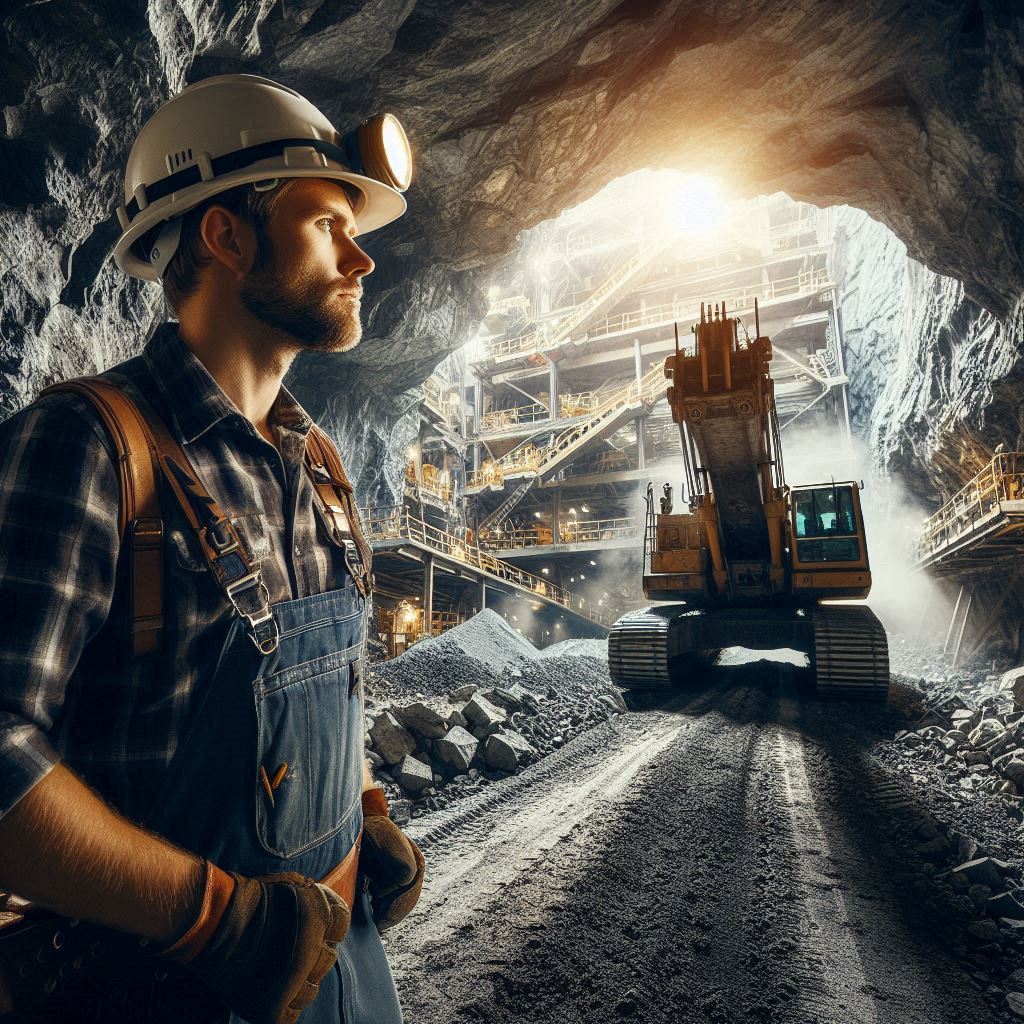Introduction
Mining engineering encompasses the study and practice of extracting minerals from the earth.
This career combines technical skills with environmental and safety concerns to ensure efficient resource extraction.
Specializations within mining engineering play a crucial role in advancing the field, addressing specific challenges, and improving operational efficiency.
This blog post explores the various specializations within mining engineering, highlighting their importance and unique contributions.
Brief Overview of Mining Engineering Career
Mining engineers design and oversee the process of extracting minerals.
They work in various environments, including underground mines, surface mines, and quarries.
The role involves evaluating mineral deposits, planning extraction processes, and ensuring safety and environmental standards.
Mining engineers must possess strong problem-solving skills, technical knowledge, and an understanding of geology and environmental science.
The field offers diverse opportunities, from working in remote locations to engaging in research and development.
Importance of Specializations Within the Field
Specializations within mining engineering are essential due to the complexity and diversity of mining operations.
Each specialization addresses specific aspects of the mining process, from initial exploration to final reclamation.
Specializations allow engineers to focus on areas such as mineral processing, mine safety, and environmental sustainability.
This targeted expertise helps improve efficiency, reduce costs, and mitigate environmental impacts.
Specializations also foster innovation, enabling engineers to develop new technologies and methods.
Purpose of the Blog Post
The purpose of this blog post is to provide an overview of the key specializations within the mining engineering career.
Understanding these specializations can help aspiring mining engineers choose a path that aligns with their interests and skills.
Additionally, this information highlights the importance of specialized knowledge in advancing the mining industry.
By exploring these specializations, readers can gain insights into the diverse career opportunities available within mining engineering.
Mineral Exploration and Evaluation
Mineral exploration and evaluation focus on locating and assessing mineral deposits.
Engineers in this specialization use geological surveys, drilling, and sampling techniques to identify potential mining sites.
They analyze data to estimate the size and quality of mineral deposits.
This specialization requires a strong understanding of geology and geophysics, as well as advanced data analysis skills.
Mineral exploration is crucial for discovering new resources and ensuring the sustainability of mining operations.
Mine Design and Planning
Mine design and planning involve creating detailed plans for the extraction process.
Engineers in this field design the layout of mines, plan extraction methods, and ensure the safety and efficiency of operations.
They use computer modeling and simulation tools to optimize mine designs.
This specialization requires knowledge of mining methods, equipment, and safety regulations.
Effective mine design and planning are essential for maximizing resource recovery and minimizing operational risks.
Mineral Processing and Metallurgy
Mineral processing and metallurgy focus on separating valuable minerals from ore.
Engineers in this specialization develop and optimize processes for crushing, grinding, and separating minerals.
They work on improving recovery rates and reducing energy consumption.
This specialization requires a deep understanding of chemical and physical processes, as well as advanced analytical skills.
Effective mineral processing and metallurgy are crucial for maximizing the value of extracted resources.
Mine Safety and Health
Mine safety and health engineers focus on ensuring the safety of mining operations.
They develop and implement safety protocols, conduct risk assessments, and monitor compliance with regulations.
This specialization requires knowledge of safety standards, hazard identification, and emergency response planning.
Mine safety and health are critical for protecting workers and minimizing accidents.
Engineers in this field play a vital role in creating safe working environments and promoting a culture of safety within the industry.
Environmental Management
Environmental management in mining engineering involves minimizing the environmental impact of mining activities.
Engineers in this specialization develop strategies for waste management, land reclamation, and pollution control.
They ensure compliance with environmental regulations and work on restoring mined land to its natural state.
This specialization requires knowledge of environmental science, ecology, and regulatory frameworks.
Effective environmental management is essential for sustainable mining practices and preserving ecosystems.
Geological Engineering Specialization
Description of the Specialization
Geological engineering is a crucial specialization within mining engineering.
Geological engineers study the earth’s crust to identify mineral deposits.
They use their expertise to determine the most efficient extraction methods.
This specialization combines geology and engineering principles to solve complex problems.
Geological engineers play a vital role in ensuring the safety and sustainability of mining operations.
They also contribute to environmental protection by assessing the impact of mining activities on the surrounding areas.
Role of Geological Engineers in the Mining Industry
Geological engineers are indispensable in the mining industry.
They conduct surveys and analyze geological data to locate mineral resources.
They design and plan mining operations to maximize resource extraction while minimizing environmental damage.
Geological engineers also assess the stability of mining sites to prevent collapses and other hazards.
They collaborate with other engineers and professionals to ensure the safety and efficiency of mining projects.
Additionally, they monitor and manage water resources, ensuring that mining activities do not negatively affect local water supplies.
Required Skills and Qualifications
Geological engineers need a strong foundation in geology, mathematics, and engineering principles.
A bachelor’s degree in geological engineering or a related field is essential.
Advanced degrees can enhance career prospects.
Practical skills, such as proficiency in using geological software and conducting fieldwork, are crucial.
Geological engineers must also possess strong analytical and problem-solving abilities.
Effective communication skills are vital for collaborating with other professionals and presenting findings.
A keen understanding of environmental regulations and safety standards is also necessary.
Career Opportunities in Geological Engineering
Career opportunities in geological engineering are diverse and rewarding.
Geological engineers can work in various sectors, including mining, oil and gas, environmental consulting, and government agencies.
In the mining industry, they can hold positions such as mine geologists, exploration geologists, or environmental engineers.
Opportunities also exist in academia and research institutions, where geological engineers can contribute to advancing the field.
With experience, they can move into management roles, overseeing entire mining operations or environmental projects.
The demand for geological engineers is expected to grow, driven by the need for sustainable resource extraction and environmental protection.
Geological engineering is a dynamic and essential specialization within mining engineering.
Geological engineers play a critical role in resource extraction, safety, and environmental protection.
Their expertise ensures that mining operations are efficient, safe, and sustainable.
With a strong educational background and a diverse skill set, geological engineers have numerous career opportunities in various sectors.
This specialization offers a rewarding and impactful career path for those interested in geology and engineering.
Read: Biomedical Engineering: Regulatory Affairs
Mining Operations Specialization
Mining operations specialization focuses on the efficient and safe extraction of minerals.
It ensures that mining processes are streamlined and sustainable. This specialization plays a crucial role in meeting global demand for raw materials.
Explanation of the Specialization
Mining operations engineers are essential in the mining industry.
They oversee the planning and management of mining activities.
Their work involves coordinating the extraction of minerals, ensuring safety, and maximizing productivity.
They also implement best practices to minimize environmental impact.
This specialization requires a deep understanding of geology, mining techniques, and equipment.
Responsibilities of Mining Operations Engineers
Mining operations engineers have diverse responsibilities.
They design mine plans, schedule activities, and manage resources.
They ensure that mining operations comply with safety regulations and environmental standards.
Engineers also monitor the performance of mining equipment and oversee maintenance.
They collaborate with geologists to determine the best extraction methods and evaluate new mining technologies.
Their goal is to achieve efficient, cost-effective, and safe mining operations.
Skills Necessary for Success in This Specialization
Success in mining operations specialization demands various skills.
Strong analytical skills are crucial for problem-solving and decision-making.
Engineers must have excellent project management abilities to handle complex operations.
Technical skills in mining software, equipment, and techniques are essential.
Communication skills are important for coordinating with teams and stakeholders.
An understanding of environmental regulations and safety standards is vital.
Additionally, adaptability and continuous learning are necessary to keep up with advancements in mining technology.
Job Prospects in Mining Operations
The job prospects for mining operations engineers are promising.
The demand for minerals continues to grow, driving the need for skilled engineers.
Opportunities exist in various sectors, including coal, metal, and non-metal mining.
Engineers can work in mining companies, consulting firms, and government agencies.
They may also find roles in research and development or academia.
Career advancement is possible through gaining experience and obtaining advanced degrees or certifications.
The mining industry offers competitive salaries and opportunities for global work.
As the industry evolves, engineers with expertise in sustainable mining practices will be in high demand.
In review, specializing in mining operations offers a dynamic and rewarding career.
Engineers in this field play a vital role in ensuring the efficient and safe extraction of minerals.
They require a diverse skill set to manage complex operations and adhere to regulations.
With growing global demand for minerals, the job prospects remain robust.
Aspiring mining operations engineers should focus on developing technical, analytical, and managerial skills to excel in this specialization.
Environmental Engineering Specialization
Overview of Environmental Engineering in Mining
Environmental engineering in mining focuses on minimizing the ecological footprint of mining activities.
Engineers in this field develop and implement strategies to reduce pollution, manage waste, and rehabilitate mining sites.
They work closely with geologists and mining engineers to ensure mining operations comply with environmental regulations.
Environmental engineers play a crucial role in balancing the demands of resource extraction with the need to protect natural ecosystems.
Transform Your Career Today
Unlock a personalized career strategy that drives real results. Get tailored advice and a roadmap designed just for you.
Start NowResponsibilities of Environmental Engineers
Environmental engineers in mining carry out several key responsibilities.
They conduct environmental impact assessments before mining operations begin.
These assessments identify potential environmental risks and propose mitigation measures.
Engineers also design and oversee the implementation of pollution control technologies to reduce emissions from mining activities.
They monitor air, water, and soil quality to ensure compliance with environmental standards.
Additionally, environmental engineers develop and manage programs for the reclamation and restoration of mined lands, ensuring that these areas can support wildlife and vegetation after mining activities have ceased.
Importance of Sustainable Practices in the Mining Industry
Sustainable practices in mining are essential for reducing environmental damage and ensuring the industry’s long-term viability.
Environmental engineers promote sustainable practices by advocating for the use of renewable energy sources in mining operations.
They also encourage the adoption of energy-efficient technologies and processes to reduce greenhouse gas emissions.
Sustainable mining practices include the responsible management of water resources, minimizing water usage, and preventing contamination of local water supplies.
By implementing these practices, the mining industry can reduce its environmental footprint and contribute to the global effort to combat climate change.
Career Paths for Environmental Engineers in Mining
Environmental engineers in the mining industry have diverse career opportunities.
They can work for mining companies, government agencies, or environmental consulting firms.
Within mining companies, environmental engineers may take on roles such as environmental compliance officers or sustainability managers.
These positions involve ensuring that mining operations adhere to environmental regulations and company policies.
In government agencies, environmental engineers may work as regulators, developing and enforcing environmental laws and standards for the mining industry.
Consulting firms offer opportunities for environmental engineers to work on a variety of projects, from conducting environmental impact assessments to developing sustainable mining practices for clients.
Additionally, environmental engineers with advanced degrees and experience can pursue careers in academia, conducting research and teaching the next generation of engineers about sustainable mining practices.
By focusing on environmental engineering, the mining industry can significantly reduce its environmental impact while still meeting the demand for essential minerals and resources.
Environmental engineers play a pivotal role in this effort, ensuring that mining operations are conducted responsibly and sustainably.
This specialization offers rewarding career opportunities for those passionate about protecting the environment and promoting sustainable practices in one of the world’s most essential industries.
Read: Graduate Studies in Biomedical Engineering
Mineral Processing Specialization
Definition of Mineral Processing Engineering
Mineral processing engineering involves the extraction and processing of minerals from ores.
It focuses on the physical and chemical processes used to separate valuable minerals from waste material.
Mineral processing engineers design, develop, and oversee processes that extract and refine metals and minerals.
They ensure efficient and environmentally sustainable extraction methods.
Duties of Mineral Processing Engineers
Mineral processing engineers play a vital role in mining operations.
They develop processes for separating valuable minerals from ores.
They conduct laboratory tests to identify the best methods for mineral extraction.
These engineers design and implement equipment and control systems for processing plants.
They monitor and optimize the performance of processing plants to maximize efficiency.
Mineral processing engineers also ensure compliance with environmental regulations and safety standards.
They work closely with other mining professionals to improve extraction processes and reduce costs.
Required Knowledge and Expertise
Mineral processing engineers need a strong foundation in mathematics and science.
They must understand the principles of chemistry, physics, and geology.
Knowledge of mechanical and chemical engineering is crucial for designing and operating processing plants.
These engineers must be skilled in data analysis and computer modeling.
They need expertise in equipment design, process control, and optimization.
Mineral processing engineers must stay updated with the latest technologies and advancements in their field.
They should have excellent problem-solving skills and the ability to work in a team.
Job Opportunities in Mineral Processing
The field of mineral processing offers numerous job opportunities.
Mineral processing engineers can work in mining companies, engineering firms, and consulting agencies.
They can find employment in government agencies and research institutions.
Job roles include process engineer, plant manager, and project manager.
Mineral processing engineers can also work in academia as professors or researchers.
The demand for mineral processing engineers is high due to the ongoing need for metals and minerals.
Career opportunities exist in various locations around the world, often in remote or rural areas.
Mineral processing specialization is a critical aspect of mining engineering.
It combines scientific principles with practical applications to ensure efficient and sustainable mineral extraction.
The field offers diverse career opportunities for those with the right skills and expertise.
Mineral processing engineers play a crucial role in the mining industry, contributing to its success and sustainability.
Read: Networking Tips for Biomedical Engineers

Mine Design and Planning Specialization
Role of Mine Design and Planning Engineers in the Industry
Mine design and planning engineers play a crucial role in the mining industry.
They ensure that mines are safe, efficient, and environmentally responsible.
Their work begins long before excavation starts, with feasibility studies and environmental assessments.
These engineers develop detailed plans that outline how a mine will operate, from the initial extraction to the final closure.
They collaborate with geologists, surveyors, and other professionals to create models and simulations that predict the behavior of rock and soil.
This role is essential for minimizing risks and maximizing productivity in mining operations.
Tasks Involved in Mine Design and Planning
Mine design and planning engineers perform a wide range of tasks.
They start by analyzing geological data to determine the most viable locations for mining.
They design mine layouts, including the positioning of shafts, tunnels, and equipment.
These engineers also plan the sequence of operations, ensuring that each step is executed efficiently and safely.
They must consider various factors such as ore grade, rock stability, and water management.
Additionally, they prepare detailed reports and presentations to communicate their plans to stakeholders.
Regular site visits are essential to monitor progress and make adjustments as needed.
Necessary Skills and Qualifications
A career in mine design and planning requires a strong foundation in engineering and geology.
Most professionals in this field hold a degree in mining engineering or a related discipline.
Technical skills in computer-aided design (CAD) and geological modeling software are crucial.
Engineers must also be proficient in data analysis and problem-solving.
Strong communication and teamwork skills are necessary, as they often work in multidisciplinary teams.
Practical experience through internships or on-site training is highly valuable.
Continuous professional development is important to keep up with technological advancements and regulatory changes in the mining industry.
Career Progression in This Specialization
Career progression in mine design and planning offers various opportunities.
Entry-level engineers typically start as junior or assistant planners, working under the supervision of experienced professionals.
With experience, they can advance to senior planner or project manager roles, taking on more complex projects and greater responsibilities.
Further career advancement can lead to positions such as mine superintendent or chief engineer, overseeing entire mining operations.
Some engineers may choose to specialize further, focusing on areas like environmental impact assessment or resource estimation.
Advanced degrees and professional certifications can enhance career prospects and open up leadership positions.
Mine design and planning specialization is a rewarding career path that combines technical expertise with strategic thinking.
It offers a dynamic work environment with opportunities for growth and development.
Professionals in this field play a vital role in shaping the future of mining, ensuring that it remains safe, efficient, and sustainable.
Read: Biomedical Engineering: Impact on Public Health
Health and Safety Engineering Specialization
Importance of Health and Safety in Mining
Health and safety in mining hold paramount importance due to the inherent risks involved.
Miners face various hazards, including cave-ins, explosions, and exposure to toxic substances.
Ensuring a safe work environment not only protects the workforce but also enhances productivity.
Accidents can lead to severe injuries or fatalities, which can disrupt operations and tarnish a company‘s reputation.
A strong health and safety culture minimizes these risks and fosters a sense of security among employees.
This focus on safety is crucial for maintaining operational efficiency and attracting skilled workers to the industry.
Responsibilities of Health and Safety Engineers
Health and safety engineers in mining are tasked with developing and implementing safety protocols.
They conduct risk assessments to identify potential hazards and devise strategies to mitigate them.
Regular inspections and audits ensure compliance with safety standards and detect any violations.
Training programs are essential to educate workers on safety practices and emergency response procedures.
Engineers also investigate accidents to determine causes and prevent recurrence.
They work closely with management to promote a safety-first mindset and integrate safety measures into all aspects of mining operations.
Their role is vital in preventing accidents and ensuring a safe working environment.
Regulations and Guidelines in the Mining Industry
The mining industry is governed by strict regulations and guidelines to ensure worker safety.
Agencies like the Mine Safety and Health Administration (MSHA) in the United States set and enforce these standards.
Regulations cover various aspects, including equipment safety, ventilation, and hazardous material handling.
Compliance with these guidelines is mandatory to avoid penalties and ensure operational licenses.
Health and safety engineers must stay updated with regulatory changes and incorporate them into safety protocols.
Regular training and awareness programs are essential to keep workers informed about these standards.
Adhering to regulations not only ensures safety but also enhances the company‘s reputation and operational integrity.
Job Outlook for Health and Safety Engineers in Mining
The job outlook for health and safety engineers in mining remains robust.
As the industry continues to evolve, the demand for skilled professionals to manage health and safety risks increases.
Companies recognize the importance of maintaining a safe work environment to avoid legal liabilities and operational disruptions.
Health and safety engineers play a critical role in this regard, making their expertise highly sought after.
The continuous advancement in mining technologies also creates opportunities for engineers to develop innovative safety solutions.
With a strong emphasis on safety, the career prospects for health and safety engineers in mining are promising and offer substantial growth potential.
Uncover the Details: Biomedical Engineering: Importance of Continuous Learning
Showcase Your Business Today
Reach thousands of readers actively exploring professional services. Publish your business profile and grow your audience now.
Publish NowDiscover More: Mentorship and Networking Tips for Systems Engineers
Project Management Specialization
Overview of Project Management in Mining Engineering
Project management in mining engineering focuses on overseeing mining projects from inception to completion.
It involves planning, coordinating, and managing resources to achieve specific goals.
Effective project management ensures projects are completed on time, within budget, and meet quality standards.
Mining engineers specializing in project management work closely with various teams, including geologists, environmental scientists, and construction workers.
They use their expertise to navigate the complexities of mining operations, ensuring safety, efficiency, and regulatory compliance.
Project management in mining engineering is essential for the successful execution of mining projects, from exploration to production.
Duties of Project Managers
Project managers in mining engineering have numerous responsibilities.
They develop project plans, outlining the scope, budget, and timeline.
They coordinate with various stakeholders, including clients, contractors, and regulatory bodies, to ensure project requirements are met.
Project managers also manage resources, such as labor, equipment, and materials, to maintain project efficiency.
They monitor project progress, identifying and addressing any issues that arise.
Safety is a critical aspect of their role, as they ensure all activities comply with health and safety regulations.
Additionally, project managers handle project documentation, including reports, permits, and contracts, ensuring all records are accurate and up-to-date.
Skills Needed for Project Management in the Field
Effective project management in mining engineering requires a diverse skill set.
Strong organizational skills are essential for managing multiple aspects of a project simultaneously.
Communication skills are crucial for liaising with stakeholders, team members, and regulatory bodies.
Problem-solving skills enable project managers to address challenges and find solutions promptly.
Technical knowledge of mining operations, including geology, extraction methods, and equipment, is vital.
Leadership skills help project managers guide their teams and make informed decisions.
Financial acumen is necessary for budgeting and cost management.
Additionally, project managers must be adept at using project management software and tools to track progress and manage resources efficiently.
Opportunities for Advancement in Project Management
Advancement opportunities in project management within mining engineering are plentiful.
Experienced project managers can move into senior roles, such as project directors or program managers, overseeing multiple projects or large-scale operations.
They may also transition into executive positions, such as Chief Operating Officer (COO) or Chief Executive Officer (CEO), where they can influence company strategy and decision-making.
Specialized certifications, such as Project Management Professional (PMP) or certifications in mining-specific project management, can enhance career prospects.
Additionally, pursuing advanced degrees, such as a Master’s in Business Administration (MBA) with a focus on project management, can open doors to higher-level positions.
Continuous professional development and staying updated with industry trends are crucial for career growth in project management within mining engineering.
In summary, project management in mining engineering plays a vital role in ensuring the successful execution of mining projects.
Project managers oversee all aspects of project planning and execution, requiring a diverse skill set to navigate the complexities of the field.
With ample opportunities for career advancement, specializing in project management can lead to fulfilling and influential roles within the mining industry.
Research and Development Specialization
Description of Research and Development in Mining Engineering
Research and development in mining engineering focus on advancing technologies and methodologies to improve mining processes.
These efforts aim to enhance efficiency, safety, and environmental sustainability.
Researchers explore new techniques for mineral extraction, processing, and waste management.
They work on projects that address industry challenges, such as reducing operational costs and minimizing environmental impacts.
This specialization involves a combination of fieldwork, laboratory experiments, and theoretical analysis.
Role of Research and Development Engineers
Research and development engineers play a crucial role in the mining industry.
They design and conduct experiments to test new mining methods and technologies.
These engineers analyze data, develop prototypes, and collaborate with other professionals to implement innovations.
Their work often leads to the development of safer and more efficient mining practices.
They also focus on improving existing technologies and solving specific problems within the mining sector.
Research and development engineers must stay updated with the latest industry trends and scientific advancements.
Innovation in the Mining Industry
Innovation drives the mining industry forward, and research and development are at its core.
Engineers in this field develop cutting-edge technologies, such as automated machinery and advanced mineral processing techniques.
These innovations enhance productivity and safety in mining operations.
For example, remote-controlled equipment reduces the need for human presence in hazardous areas.
New methods for ore extraction and processing minimize waste and environmental damage.
Continuous innovation ensures the mining industry remains competitive and sustainable.
Career Prospects for Research and Development Specialists
The career prospects for research and development specialists in mining engineering are promising.
These professionals are in high demand due to the industry’s constant need for innovation and improvement.
Career opportunities exist in mining companies, research institutions, and government agencies.
Research and development specialists can advance to senior positions, leading projects and teams.
They may also work as consultants, providing expertise to various stakeholders in the mining industry.
The skills acquired in this specialization are transferable, offering opportunities in related fields such as environmental engineering and materials science.
Research and development specialization in mining engineering offers a dynamic and impactful career path.
By focusing on advancing technologies and improving processes, these professionals play a vital role in shaping the future of the mining industry.
Their work not only enhances operational efficiency but also contributes to sustainability and safety in mining practices.
The demand for innovation ensures a steady stream of opportunities for those pursuing a career in research and development within mining engineering.
Conclusion
Mining engineering is a diverse field with numerous specializations that cater to different aspects of mining operations.
Each specialization focuses on a unique area, from the initial exploration of mineral deposits to the safe and efficient extraction of resources.
This variety allows mining engineers to choose a path that aligns with their interests and skills.
Understanding these specializations helps aspiring engineers make informed career choices and find their niche in the industry.
Exploration Engineering
Exploration engineers focus on identifying and evaluating potential mineral deposits.
They use geological surveys, drilling, and sampling techniques to locate valuable resources.
Their work involves analyzing data to assess the feasibility of mining operations.
This specialization is crucial for discovering new deposits and ensuring that mining activities are carried out in promising locations.
Exploration engineers often work in the field, which requires a combination of technical expertise and hands-on experience.
Mining Operations
Mining operations engineers manage the day-to-day activities of mining sites.
They oversee the extraction processes, ensure safety compliance, and optimize production efficiency.
This specialization requires strong skills in managing personnel and equipment while maintaining safety standards.
Operations engineers play a vital role in the success of mining projects by ensuring that resources are extracted in a cost-effective and environmentally responsible manner.
Mineral Processing
Mineral processing engineers work on the separation and refinement of extracted ores.
They design and manage processes to convert raw minerals into valuable products.
This involves using techniques such as crushing, grinding, and chemical processing.
Mineral processing is essential for turning mined resources into usable materials.
Engineers in this field must have a deep understanding of chemistry and materials science.
Environmental Engineering
Environmental engineers in mining focus on minimizing the environmental impact of mining activities.
They develop strategies for waste management, water treatment, and land reclamation.
This specialization ensures that mining operations adhere to environmental regulations and sustainable practices.
Environmental engineers play a crucial role in balancing resource extraction with ecological preservation, making their work essential for the future of mining.
Geotechnical Engineering
Geotechnical engineers specialize in understanding the mechanical behavior of earth materials.
They assess soil, rock, and other geological factors that affect mining operations.
This specialization involves analyzing stability, designing support systems, and mitigating risks associated with ground conditions.
Geotechnical engineers help ensure the safety and stability of mining structures, which is critical for preventing accidents and maintaining operational efficiency.
The Diverse Opportunities Within the Field
The mining engineering field offers a wide range of specializations, each with its own set of opportunities.
From exploration to environmental management, there are numerous paths to choose from.
This diversity ensures that mining engineers can find a niche that suits their skills and career goals.
[E-Books for Sale]
The Big Book of 500 High-Paying Jobs in America: Unlock Your Earning Potential
$19.99 • 500 High-Paying Jobs • 330 pages
Explore 500 high-paying jobs in America and learn how to boost your career, earn more, and achieve success!
See All 500 High-Paying Jobs of this E-Book
1001 Professions Without a Degree: High-Paying American Jobs You Can Start Now
$19.99 • 1001 Professions Without a Degree • 174 pages
Discover 1001 high-paying jobs without a degree! Unlock career tips, skills, and success strategies for just $19.99!




